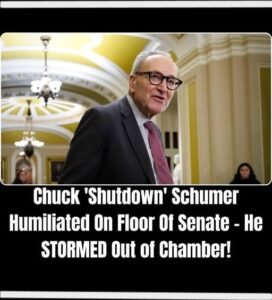Schumer and Moreno Clash Over ACA Subsidy Extension as Shutdown Drags Into Sixth Week

As the partial federal government shutdown entered its 39th day on Saturday, tensions in the U.S. Senate reached a breaking point. A sharp exchange between Senate Minority Leader Chuck Schumer and Republican Senator Bernie Moreno of Ohio exposed the growing frustration in Washington over how — and when — to bring federal operations back online.
The confrontation occurred on the Senate floor after Schumer circulated a draft proposal intended to end the impasse. His plan centered on extending the Affordable Care Act (ACA) premium subsidies for another year — a measure Democrats say is crucial to protecting millions of Americans from losing their health insurance during the funding freeze.
A Proposal — and an Objection
According to multiple senators present, Schumer approached Moreno to explain his proposal in person. The Democratic leader described it as a straightforward fix, requiring only a brief amendment to continue the ACA subsidies for one more year.
“It’s very simple — just a few lines,” Schumer said, noting that the goal was to keep families from facing coverage gaps while longer-term negotiations continued.
But Moreno immediately pressed for details. He asked whether the plan included any income limits — an issue that has divided the parties since pandemic-era changes allowed some higher-income Americans to qualify for subsidized coverage.
Moreno pointed out that, as presented, Schumer’s plan still lacked income thresholds. “So people making one, two, even three million dollars a year would still qualify?” he asked.
Schumer pushed back, insisting the measure was temporary. “We’d pass the one-year extension first, so people aren’t left stranded,” he said, “and then we’d negotiate the rest.”
A Heated Exchange
The discussion grew tense when Moreno repeated his concern: “So for this one year, people making millions could still receive these subsidies?”
Schumer bristled, accusing Republicans of focusing on wealthy outliers instead of the millions of working families who depend on the ACA for affordable care. Witnesses said Schumer ended the conversation abruptly and walked out of the chamber.
Speaking to reporters later, Moreno expressed irritation at Schumer’s exit. “I was going to ask him more questions before he stormed off,” he said, calling the Democratic leader unwilling to engage on what he viewed as “serious concerns” about fairness and cost.
Moreno also said he wanted clarification on whether the extension would keep zero-premium plans intact and how much of the new funding would ultimately benefit insurers rather than families.
Broader Battle Over Funding
The encounter came as the government shutdown — now well into its sixth week — showed few signs of resolution. The impasse began on October 1, when Democrats, Republicans, and the White House failed to agree on a spending framework.
Democrats have insisted that any funding package must include a one-year continuation of the enhanced ACA subsidies, which are otherwise set to expire. They argue that cutting off the extra support mid-shutdown would force millions to lose affordable coverage just as renewal periods approach.
Republicans, meanwhile, accuse Democrats of holding the budget process hostage with unrelated policy demands. They maintain that the pandemic-era subsidy expansions were meant to be temporary and should not be renewed without significant reforms.
Democrats counter that Republicans are ignoring the real-world consequences of removing the subsidies. Roughly 16 million Americans buy insurance through the ACA marketplace, and many rely on these subsidies to keep premiums manageable.
Politics and Pressure
Behind the legislative dispute lies a mounting political standoff. Both parties face increasing pressure from constituents and advocacy groups as the shutdown continues to disrupt federal programs and furlough tens of thousands of workers.
President Donald Trump has indicated he will not support any budget deal that extends the ACA subsidies without adding new restrictions and oversight.
In a strategic pivot, Senate Democrats recently attached the subsidy proposal to the broader funding measure — prompting sharp criticism from Republican leaders, who accused them of escalating the crisis instead of resolving it.
Still, both sides recognize the high stakes. Pandemic-era expansions to the ACA boosted enrollment to record levels, but they also drove up costs and opened new debates about eligibility and program integrity.
The Path Forward
Despite the fiery moment between Schumer and Moreno, aides for both parties confirmed that quiet discussions continue behind the scenes. Senate Majority Leader John Thune has said Republicans are open to negotiating health-care provisions — but only after the government is reopened or a short-term funding bill is passed.
Schumer maintains that an immediate extension is the only way to prevent insurance disruptions for millions of Americans. Some bipartisan analysts have floated a middle ground: extending subsidies for a shorter period while adding temporary income caps and stronger anti-fraud measures.
Whether either side accepts that compromise remains uncertain.
Conclusion
The Schumer–Moreno clash captures the broader dysfunction gripping Congress as the shutdown nears the six-week mark. With neither side showing signs of backing down, both parties risk deepening public frustration while essential government services remain paralyzed.
Until lawmakers bridge the divide over ACA funding — and the larger question of spending priorities — the path to reopening the government remains murky, and the political costs for Washington’s gridlock continue to climb.